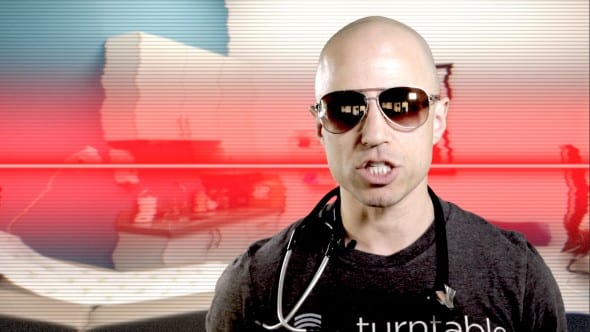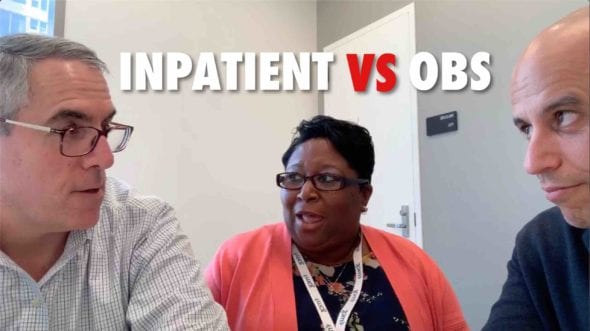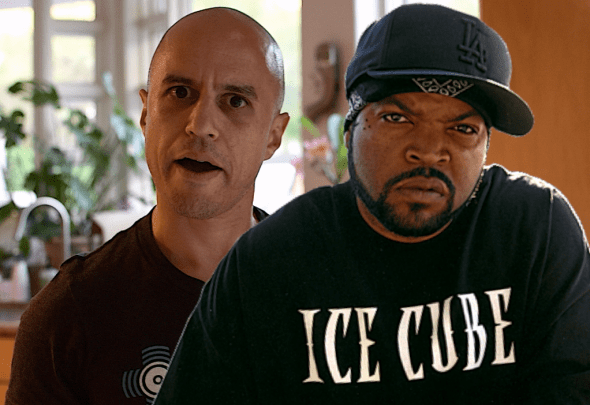Here’s why the CDC recommending COVID vaccine boosters for young and healthy people is a bad idea and might actually prolong the pandemic.
– [Zubin] All right, today the CDC came out and changed their guidance. Before they were saying people over 18 COULD get a booster for Pfizer, Moderna, and Johnson & Johnson. Now they’re saying they SHOULD get a booster. So let’s just clarify this. Healthy young people 18 and over without comorbidities who’ve had two doses of an mRNA vaccine or one of the Johnson & Johnson, if it’s been six months for the mRNA vaccines or two months out from Johnson & Johnson, should get a booster according to CDC.
Okay, this to me, and to Paul Offit and Krause and Gruber, they co-wrote a piece in “Washington Post” which I’m gonna link to talking about this, these guys are two FDA regulators and an FDA advisory committee member who disagree with this and spelled out really good reasons. Let’s go through it. Now, first of all, I wanna say this, the Johnson & Johnson shot is a little less effective, maybe more than a little less effective than the Pfizer and Moderna mRNA shots. That may have been best as a two-dose shot to begin with instead of a single dose.
So I’m not gonna really talk about whether we ought to boost Johnson & Johnson folks. I think probably yes, and there are much fewer of those than the mRNA people. So I’m gonna take that off the table for a second and focus on the mRNA guys. So first of all, why is boosting healthy young people even proposed? All right, there is this perception and messaging from our public health apparatus that is saying that these vaccines, the mRNA vaccines, wane in efficacy over time. So as you get months out, they don’t work as well. Now, why is this not correct in the sense that we care about? Well, okay, first of all, what do they mean? They’re talking about asymptomatic and mildly symptomatic and even moderately symptomatic infections.
They are not talking about the severe disease that gets you thrown in the hospital, for most people, right? For young healthy people who I’m targeting here. So what that means is, yeah, mild infections do decrease as your antibody levels decline, but these vaccines do more, they’re actually quite remarkable, they do more than just antibodies. They create memory T and B cell responses that can be fired up once you’re infected. So you may get infected, you may have some viral replication, you may feel a little crappy, but then the immune system kicks in as it’s been trained to do from these incredibly effective vaccines and you stay out of the hospital, which is what we care about. Oh, my God, seven billion people got a cold. We don’t care about that.
Oh, my God, even a hundred thousand people get a potentially fatal, hospitalizable, ICU-level illness that overwhelms our hospitals, destroys the ability to care for elective procedures and other diseases that aren’t COVID, and throw the media and the public into a fear-based contagion panic. So that’s the big thing here, is do we still have protection against severe disease? Well, according to a couple of studies cited in the paper, we do. It’s still greater than 90% protection for the mRNA vaccines six months out and longer against severe disease. So, all right, so we’re protected still against severe disease. By the way, even a 10% failure rate is gonna lead to a lot of hospitalizations among vaccinated people, which we do see, right?
Although, the majority of people that are getting sick and dying in the hospital are unvaccinated people, okay? So we still have very good protection against severe disease. So why then are they still talking about vaccinating young people? Well, the concern is, what if it is going to wane even against severe disease? And they cite Israeli data, a small Israeli trial where, now, remember, in Israel, they gave nothing but Pfizer. They gave it very early, all right? So in the early data, it’s like, “Oh, it looks really good,” because, actually, a lot of people hadn’t been naturally infected.
They gave only Pfizer, which is a little less efficacious than Moderna but still, three weeks apart dosing, et cetera, and what they saw was, “Oh, look, you know, there’s more breakthrough infections as a thing wanes,” and then Delta came and they started a vigorous campaign of boosting and then they said, “Look, the boosting worked.” The Delta wave faded out. All right, well, so here’s what’s going on there. It’s entirely possible that those studies had some flaws. One of them is the unvaccinated group that they were comparing to, this was now months down the line, how many of those had actually been naturally infected and had some pretty good immunity? So now you’re comparing vaccine immunity to natural immunity and that gap starts to narrow, doesn’t it?
And as Paul Offit himself says, “Hey, natural immunity actually is a thing.” So that’s one reason you might see waning efficacy in a trial in Israel. And then what about the crash in Delta after boosting? Well, Delta actually declined in the US and other parts of the world as well at the same time in the absence of boosting, much less vaccinated communities. Why? Well, I did a video on this. Because human behavior changes when they see Delta spin up, people get naturally infected and they get immunity from that, you have vaccine immunity that’s already happened, and then you have the natural viral dynamics of these cyclical waves, which we can’t fully explain but that just seems to be how these viruses work. So there are some confounders there.
So if we’re relying on Israeli data for this, uh, I’m not sure about that. Now, why would efficacy be waning in the first place apart from the fact that antibodies start to drop? Well, one of the reasons is the advent of Delta since the original trials which were not with Delta. Delta is much more contagious than the previous strains and therefore you need more vaccination rates to tamp down the levels in the community because the thing can spread so much more easily. So where does Omicron come into all this? People are like, “Oh, my God, Omicron. We better get boosted.”
Okay, there’s some possibility that, let’s say, first of all, Omicron’s a big deal in terms of causing severe disease. We don’t know that yet. In fact, preliminary reports out of South Africa from some doctors are like, “Nah, pretty much we’re seeing just mild disease and it’s in younger people.” Well, if that’s the case, that’s great ’cause then you have a highly transmissible cold that will vaccinate people by infecting them. Now, that may be very optimistic, right? It may be that the thing is actually Delta-ish. Who knows, right? We don’t know because we don’t have the data yet. It’s still quite early.
What is it, November 29th right now that I’m recording this. So if Omicron is a little bit resistant to vaccine, which, again, we don’t know, and natural immunity and then you boost with this original vaccine, okay, yeah, you may top up neutralizing antibody levels to high levels so that you can prevent actual short-term infection, not necessarily severe disease, short-term infection, and maybe it even works against Omicron. So there’s something there and you’d wanna time it and so on. But what if that’s not true? What if Omicron is actually more in the vaccine escape spectrum where it’s not gonna work with these previous vaccines? So what are we doing? We’re just continually retraining the immune system against the original strain so that there is some theoretical idea that then a new booster that’s reformulated for Omicron, which would take a couple months, three months, to produce if we need it, would potentially be less effective because the immune system is kind of imprinted on the original strain. That’s a possibility. It’s not necessarily a likelihood.
But it’s another reason that willy-nilly boosting a bunch of young people against the original strain when it’s not necessarily gonna help them isn’t a good idea. But who would it help? Boosting is a great idea for people with immune compromise, like all the elderly, so people over 65, because they just don’t have immune systems that respond as robustly. So yes, boost over 65 year olds. And yes, boost over 50 year olds with lots of comorbidities if they have, you know, diseases that put them at risk because, again, they’re at higher risk for severe disease so a booster might help.
And then young people, the young people you oughta be boosting are people who are household contacts of people who are at very high risk, why? Because boosting young people doesn’t necessarily prevent severe disease in them but it might prevent getting infected in the first place by bumping up your neutralizing antibodies which will then wane over time, right? So it’s kinda like a short-term boost. That’s what it is. It’s like a little turbo boost. Well, that could keep your household contacts safe if you’re the type of person who’s out there in the community getting exposed a lot to coronavirus.
For example, you’re a healthcare worker, you’re a frontline worker, and you’re living with somebody or exposing someone at work who’s at very high risk. Those people, probably reasonable to get boosters. Now, everybody else, why is it a bad idea? Well, okay, number one, all of our public health resources right now seem to be talking, I’m exaggerating a little but not much, seem to be talking about boosting. What about the 30% of Americans that still aren’t vaccinated? You don’t, as Rochelle Walensky from CDC said early on in, I don’t know, September or something, “We won’t boost our way out of this pandemic.” You’re right. We will naturally infect and vaccinate ourself out of this pandemic. So why aren’t we focusing every single dollar on going to door to door to unvaccinated people and begging them to teach them about the vaccine and if they still decline, fine, but just really, really focusing on that, okay?
What about the fact that Omicron probably arose in southern Africa where vaccination levels are abysmal? Okay, we made a political decision to instead of spinning up enough vaccine for these guys that need it to boosting young healthy people. How is that gonna, it just makes very little sense. So even our chatter, even the news chatter and stuff talking about boosting, ought to be talking about vaccinating people who are unvaccinated, right? That’s how you keep your hospitals from being overwhelmed. That’s how you respect the sacrifice of frontline healthcare professionals. That’s how you keep Grandma safe. That’s what you do, all right? So I think it’s important. The other thing you have to think about is, again, what’s the endpoint?
Preventing severe disease. Do everything you can to do that. Vaccinate people for the first time. Johnson & Johnson, maybe they ought to get a booster because their vaccine isn’t quite as effective. It probably should have been a two-dose to begin with. Okay, that’s a different subject. What about side effects? Well, look, these vaccines are pretty safe, but young healthy people, there is the myocarditis risk. We don’t know what it is with boosting ’cause we don’t have access to that data unless CDC has it and they’re not sharing it with us. And any side effect of the vaccine, if it’s not providing a benefit, is a downside. Even if it’s just being out for a day with fevers and rigors and chills and headache and fatigue from work. That’s a productivity hit with no benefit.
So why are we pushing that, right? And if a few people get myocarditis from the booster, that’s even more. They end up hospitalized for a period of time. It usually gets better, it’s usually fine, but still, why if it doesn’t have a benefit? Why are we even talking about this? I mean, we should talk about everything, we should debate everything, but, you know, you see what I’m saying? Now, so what should we be focusing on? Well, over 65s who should be getting boosted, only 40% of them have. Why aren’t we talking about that more, right? And then the idea about really focusing on vaccinating the rest of the world that’s generating variants. You know, whether or not they’re serious we don’t know yet, but we oughta be doing something about that, us great rich nations that have it all together. We can’t even pull our own ish together. So that’s the take on boosters. I’m gonna link, again, to Offit’s piece in “Washington Post.”
There’s another piece I may link to. These are smart people who are presenting a counternarrative that isn’t even so much of a counternarrative because the public is wary of all this confused messaging, right? Two FDA officials resigned over this, this idea that, you know, somehow we’ve politicized boosters when we oughta be looking at the science. The science. We oughta be looking at science on this, all right? So that’s what I think. Now, there could be new data either that CDC hasn’t shared, although, usually Paul has access to that, or there’s something else that’s going on that will arise that will change my opinion on this. That’s called science. That’s actually looking at data, updating your prior assumptions, and being really an alt-middle, looking at all sides and trying to find truth in the now, right? As best you can. That means changing your mind from time to time, right? That’s okay.
All right, so if you like the way we talk about these things as opposed to, say, mainstream media or our politicians or our government officials or whatever, please just share the video, leave a comment, hit Like, subscribe to the platform on YouTube or Facebook or wherever you are and hit the little notification bell, but if you really like what we do and you wanna talk more about things other than COVID too, like meditation, awakening, personal growth, things like that, as well as health stuff, join our Supporter group. You pay for all of this. It’s five bucks a month. And my favorite platform is Locals. You go to ZDoggMD.locals.com, sign up there, and you join a tribe of other like-minded alt-middle thinkers. You share your own content. I do live shows almost every night just for you guys and we do not censor the F-bombs. All right, guys, I love you so much. Please, let’s just try to think clearly. Let’s not stifle debate, all right? Let’s talk about these things rationally. All right, I love you guys so much, and we are out, peace.
Related Videos
Category
- The ZDoggMD Show (797)
- Featured Videos (188)
- Doc Vader (142)
- Against Medical Advice (128)
- Medical Humor (95)
- Public Service Announcements (87)
- Music Parodies (74)
- Nurses (59)
- Meditation (38)
- ZVlogg (36)
- The VPZD Show (31)
- ZTalks (28)
- ZBlogg (24)






